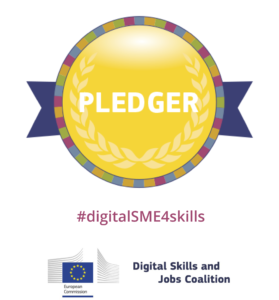KOYS Lab is involved in several Research and Innovation initiatives
This CEN Workshop Agreement (CWA 17796:2021) has been developed in accordance with the CEN-CENELEC Guide 29 “CEN/CENELEC Workshop Agreements – A rapid prototyping to standardization” and with the relevant provisions of CEN/CENELEC Internal Regulations. CWA 17796 Responsibility-by-design – Guidelines to develop long-term strategies (roadmaps) to innovate responsibly was published by CEN.
Responsible research and innovation (RRI) addresses the development of products and processes that are safe, ethically acceptable, and responsive to the needs and expectations of people and society. The RRI roadmap proposed in this guideline adapts a generic IPRM architecture to the definition of long-term visions and action plans for RRI uptake within the innovation strategies of organizations and others agents (e.g., cooperative projects) active in research and innovation. It provides the methodological and technical conditions to address RRI principles in the context of rapid (and possibly disruptive) scientific and technological
developments to ensure such developments are relevant to society. The guidelines offered here were developed by the PRISMA project, which worked with eight industrial pilot projects dealing with the application of transformative technologies in different sectors. The pilots were used to integrate RRI principles in the participating companies’ strategies and actions in order to improve the societal value and overall performances of their R&D (research and development) outcomes and to develop specific “pilot RRI roadmaps”.
Social economy and social entrepreneurship
The study is set out to examine, benchmark and diffuse initiatives and social policy innovation practices, necessary for promoting a successful approach to the social economy and social enterprises. The raison d’être is to explore opportunities and challenges that digital technologies pose for the social economy and social enterprises and obtain a better understanding of the ways in which the design and implementation of EU and national policies and initiatives can support the digitisation and uptake of novel digital technologies for the social economy and by social economy enterprises. Thus, the challenges we address involve:
- The gap in between current digital skills, the capacity of social economy enterprises and what is actually needed;
- The lack of knowledge-sharing between social innovators and between public authorities on good practices and their key design and implementation points; and
- The lack of data and research about the specific impact of digitalisation on the governance, models and strategies of social enterprises.
The overall strategic aim of the study is summarised into the following operational objectives:
- Objective 1: Identification and promotion of good practices and lessons learnt on the impact of digitalisation on social entrepreneurship and the social economy. In this repsect, a number of case studies will be identified in 4 EU countries (Italy, Netherland, Greece and the United Kingdom);
- Objective 2: Vision potential future trajectories of digital platforms, open source and disruptive technologies and their consequent implications upon the social economy and social entrepreneurship (in terms of impact and business models);
- Objective 3: Explore how public authorities define their digital technology priorities, and the contribution of social economy/social entrepreneurship in this process;
- Objective 4: Formulation of practical recommendations for policymakers as well as social entrepreneurs on the promotion/uptake/scale-up/scale-out of digital technologies for social entrepreneurship/social economy.
The study is carried out by Q-PLAN INTERNATIONAL (lead), the Manchester Institute of Innovation Research at the University of Manchester and the United Nations University – Maastricht Economic and Social Research Institute on Innovation and Technology and the following subcontractors: Dr F. Niglia and Dr V. Kostakis. Finally, the study is funded from the European Commission’s Executive Agency for Small and Medium-sized Enterprises (EASME).
Marine Knowledge Sharing Platform for federating Responsible Research and Innovation Communities
Marine Knowledge Sharing Platform for federating Responsible Research and Innovation Communities
We have always relied on the seas – for food, economic exploitation, transport. Now – with the climate change in progress – the marine ecosystem in Europe is in serious danger. We will be able to reverse this trend if we join forces.
The EU MARINA project, funded under Horizon 2020, aims to integrate citizens’ visions, needs and desires into science and innovation, promoting Responsible Research and Innovation (RRI) and focusing on marine issues and pressures that have significant effects on the European societies.
KOYS Lab joined the ranks of the European Digital Skills and Jobs Coalition by pledging to train professionals and equip them with high-level digital skills. By doing so, KOYS Lab has joined numerous other European Small and Medium-sized Enterprises (SMEs) participating in the #digitalSME4skills campaign launched by the European DIGITAL SME Alliance (DIGITAL SME).
“Digital SMEs are the key players and the driving force of European digitisation as they play a fundamental role in transferring digital technologies to industry. Thus, digital SMEs have the relevant expertise to train Europe’s new digital professionals. KOYS Lab is one of such actors, and it is my honor to welcome their participation in #digitalSME4skills” – said Oliver Grün, the President of DIGITAL SME.
“KOYS Lab is proud to join this Europe-wide campaign. It is our pleasure to be one of the pledgers, and to contribute to a total number of 5000 young professionals that the campaign will train by 2019” – added Francesco Niglia, CEO. #digitalSME4skills campaign, which was set in motion by the DIGITAL SME in 2017, primary targets students and young practitioners who want to become ICT professionals. By offering work experience schemes, such as apprenticeships, traineeships and internships, in 28 EU Member States and beyond the campaign gives a chance for young professionals to acquire high-level digital skills directly from a company specializing in digital solutions.
The campaign is ran within the framework of pledges for action initiated by the Digital Skills and Jobs Coalition. This Coalition is constituted of representatives from the EU Member States, companies, social partners, non-profit organisations and education providers who together seek to find the solutions for a lack of digitally skilled people in the European labour market.

